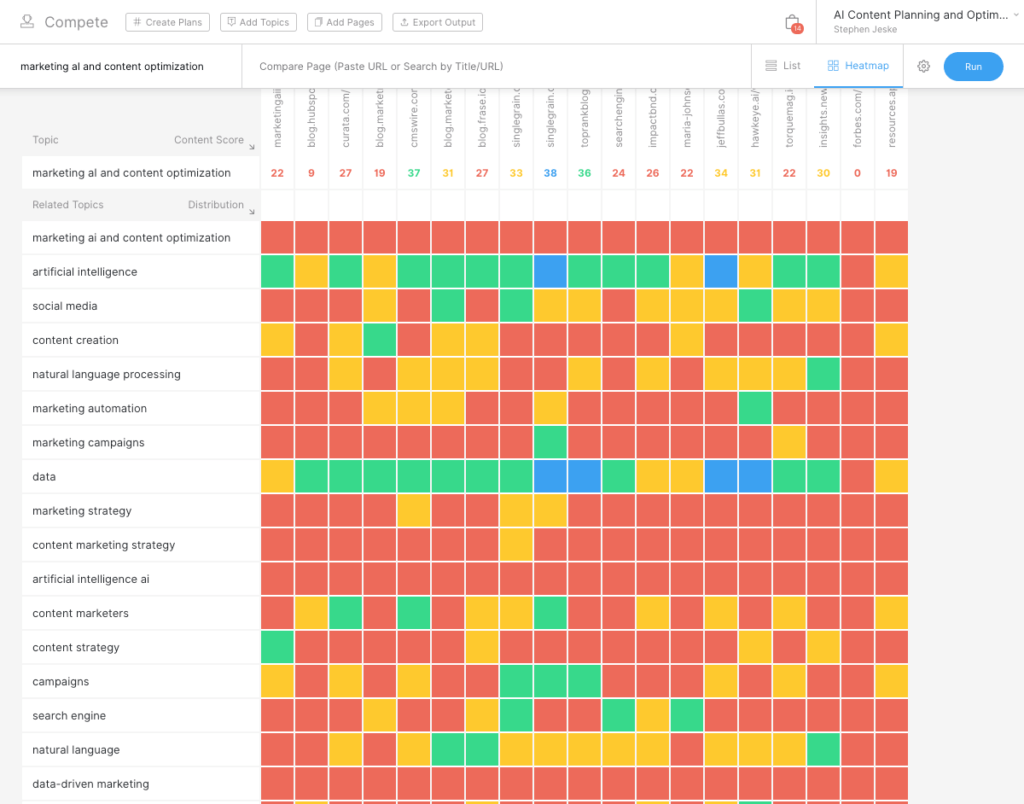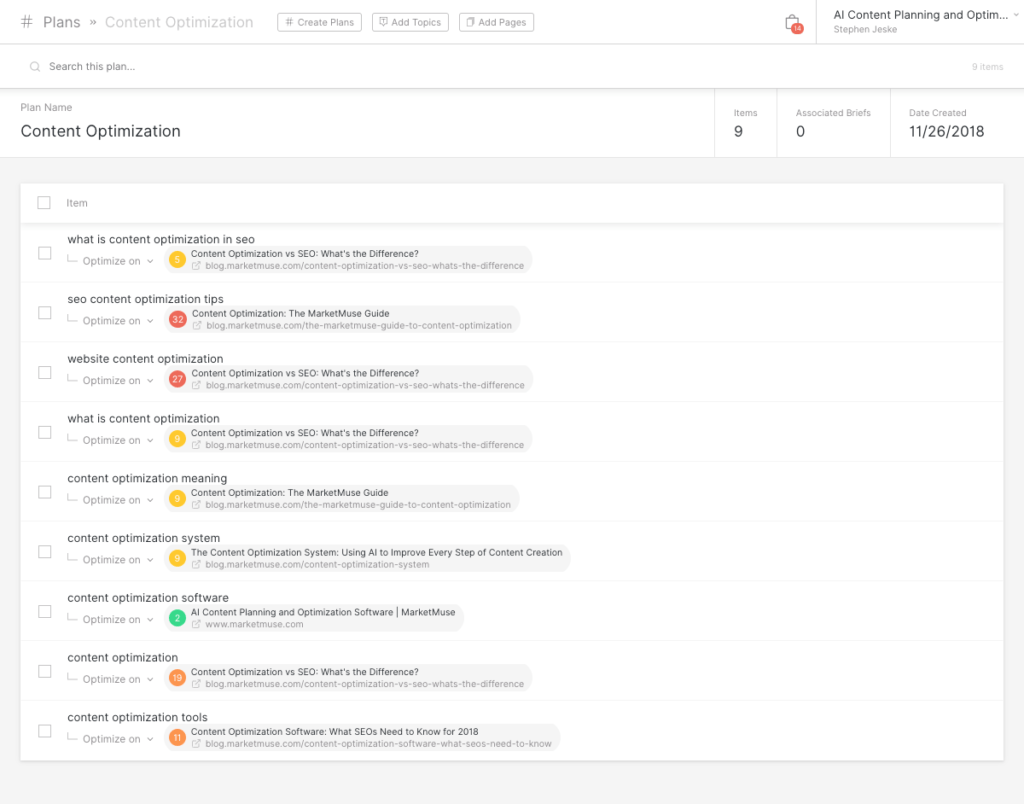Marketing AI Use Cases: Why Content Optimization Ranks so High
In December 2018, the Marketing AI Institute released an industry report entitled “Top 25 Use Cases for Marketing Artificial Intelligence.” Although there’s no shortage of headlines claiming artificial intelligence will take our content marketing jobs, this survey reveals something much more down-to-earth.
Content marketers expect AI to help them do a better job and a big part of that job involves optimizing content. Four of the top 25 use cases are:
- Analyze existing online content for gaps and opportunities
- Choose keywords and topic clusters for content optimization
- Create data-driven content
- Optimize website content for search engines
I find this interesting in particular for what we don’t see. In the report, there’s no mention of the content marketing equivalent of an autonomous vehicle. So no bionic newsroom here folks.
Granted that sort of thing has been done before and it is very domain specific with limited applications.
After all, how many newsrooms can leverage artificial intelligence to create their stories? Not that many.
And Skynet? Fuhgeddaboudit!
What’s Driving the Need for Practical AI Marketing Automation
What the report reveals is that content marketers have more pressing and immediate needs.
With 4 million blog posts published daily and over 5 billion Google searches made every day, there’s a lot of content getting served.
You can probably guess where I’m going with this (hint… think content creation and search engine optimization).
That’s no surprise when you stop to think about it. Forget this talk of social media, email marketing, influencer marketing and whatever else may be the “mot du jour.” Content marketers, as the Marketing AI Institute report reveals, need help with the more mundane tasks of creating the best content possible and optimizing the rest.
Doing this at scale is not easy. Forget the gut check, you’ll need lots of data to make this work.
Although you can optimize content manually, AI technology makes the job infinitely easier.
How Content Strategy Changes With A Site’s Age
It’s those large sites with thousand of pages of content which stand to benefit the most from advancements in artificial intelligence. In a young site, everything revolves around new content.
But as a site matures, there’s a significant body of existing work that accumulates.
Slowly but surely, there’s a shift away from producing only new content as stakeholders start to discover the value of existing content. But to unlock the value of that body of work requires effort in itself. Optimizing existing content may be easier than starting from scratch, but it’s still no walk in the park.
So, where do you start?
The more pages you have, the more important this question becomes. Given finite content resources how do you properly prioritize content initiatives that will have positive ROI?
How do you decide?
Remember, no gut checks. Data-driven marketing is where it’s at!
Using an AI-powered platform like MarketMuse makes it simple. Every page has its’ own opportunity score; the higher the score the better the opportunity.
Opportunity Score takes hundreds of factors into account, including:
- Content Quality
- Content Comprehensiveness
- Search Volume
- Topical Authority
- Site Authority
- Competition
- Variants
- Relevance
- Current Coverage
AI makes quick work of this data analysis. Literally, it can analyze and derive an opportunity score in the time it takes you to read this sentence.
Let the content optimization process begin!
Analyze Existing Online Content for Gaps and Opportunities
It’s not surprising that content gap analysis is top-of-mind when it comes to AI use cases, for three reasons:
- Exploiting content gaps can provide a serious competitive advantage when it comes to ranking in the SERP.
- Finding these gaps is incredibly labor intensive and doing this manually is not scalable.
- It would be ideal if we could prevent content gaps from occurring in the first place.
If you believe that a search engine wants to offer the most relevant, high-quality and in-depth content, then your goal should be creating content that meets that criteria. AI tools coupled with natural language processing algorithms make this a process that can be scaled.
By analyzing thousand of pages of similar content, a topic model can be quickly created. Based on that model, content gaps can be easily identified.

In this screenshot, each red square represents a gap in the content of the top ranking URLs. Read the map vertically to see the content gaps on a specific page. Read horizontally to determine the extent to which an individual topic is addressed by the competition as a whole.
Performing this analysis prior to creating a piece of content identifies those competitive weaknesses. This can be baked into the creation process so that they are addresses prior to publication. In other words, when it comes to creating in-depth content, you can get it right on the first try.
Choose Keywords and Topic Clusters for Content Optimization
It’s not enough to create an in-depth, high-quality piece of content. Publishing a large quantity of articles isn’t necessarily the solution either. To be recognized by a search engine as an authority on a specific topic, your site needs to be organized into clusters of relevant content addressing every single aspect of that topic.
Site authority plays a big role in the ability to rank well.
On the surface, creating content clusters appears to be a simple strategy. But it’s difficult to implement on a site with thousands of pages.
Where do you start?
What are the best pages to link together?
It’s no wonder everyone’s looking for a marketing technology that can offer a solution.
An AI platform that uses predictive analytics provides insights on those pages that offer the best opportunity (ROI). Associating topics with individual pages helps create groups of relevant content that can be linked together into appropriate content clusters.

Create Data-driven Content
As data-mining techniques have advanced, data-driven marketing has become ubiquitous. So, if we’re taking a data-driven approach, why can’t we do the same with content creation?
A simple approach is to use data to determine popular topics and write content based on that criteria. A more sophisticated approach is to use AI to model any topic so you know how to adequately cover it.
Optimize Website Content for Search Engines
With search engine traffic playing a vital role in content marketing strategy, it’s no wonder that many marketers are looking to AI for help in optimizing their content for search. Because search is a zero-sum game (you gain is the result of someone’s loss) competition is intense and players are constantly striving for dominance.
Artificial intelligence can provide that unfair advantage. When you know how search engines define quality, the weak points in the competition, and how to improve, you truly do have the upper hand.
Conclusion
While it can be fun to speculate on the potential of artificial intelligence, every day content marketers are faced with pedestrian challenges. For that they need smarter software to help them get their jobs done, today.
Featured Image vector Designed by Freepik
Stephen leads the content strategy blog for MarketMuse, an AI-powered Content Intelligence and Strategy Platform. You can connect with him on social or his personal blog.